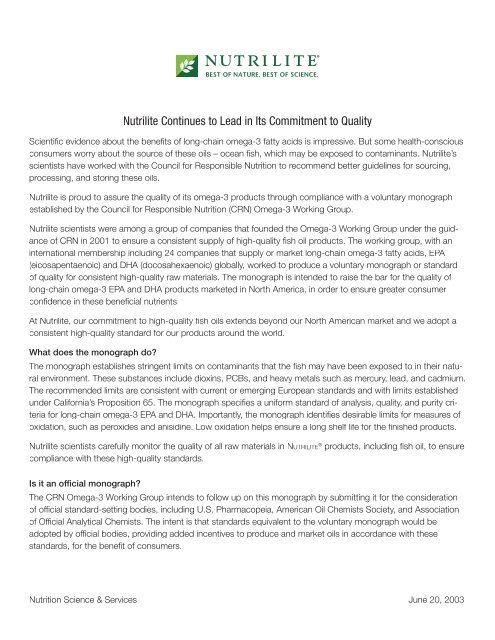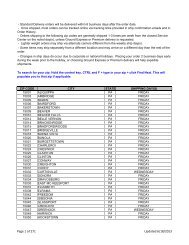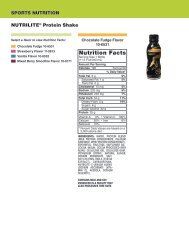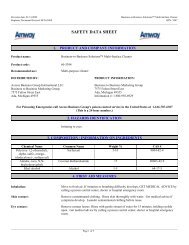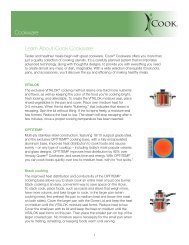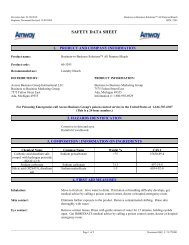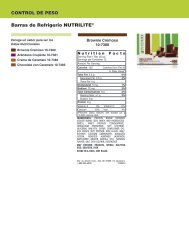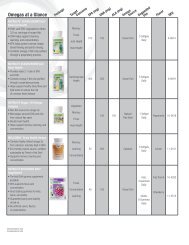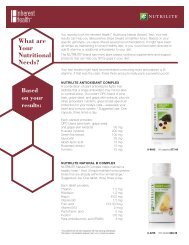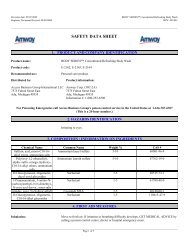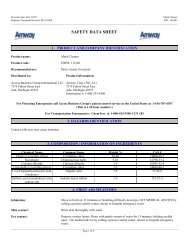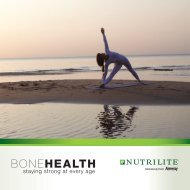Create successful ePaper yourself
Turn your PDF publications into a flip-book with our unique Google optimized e-Paper software.
<strong>Nutrilite</strong> Continues to Lead in Its Commitment to QualityScientifi c evidence about the benefi ts of long-chain omega-3 fatty acids is impressive. But some health-consciousconsumers worry about the source of these oils – ocean fi sh, which may be exposed to contaminants. <strong>Nutrilite</strong>’sscientists have worked with the Council for Responsible Nutrition to recommend better guidelines for sourcing,processing, and storing these oils.<strong>Nutrilite</strong> is proud to assure the quality of its omega-3 products through compliance with a voluntary monographestablished by the Council for Responsible Nutrition (CRN) Omega-3 Working Group.<strong>Nutrilite</strong> scientists were among a group of companies that founded the Omega-3 Working Group under the guidanceof CRN in 2001 to ensure a consistent supply of high-quality fi sh oil products. The working group, with aninternational membership including 24 companies that supply or market long-chain omega-3 fatty acids, <strong>EPA</strong>(eicosapentaenoic) and <strong>DHA</strong> (docosahexaenoic) globally, worked to produce a voluntary monograph or standardof quality for consistent high-quality raw materials. The monograph is intended to raise the bar for the quality oflong-chain omega-3 <strong>EPA</strong> and <strong>DHA</strong> products marketed in North America, in order to ensure greater consumerconfi dence in these benefi cial nutrients.At <strong>Nutrilite</strong>, our commitment to high-quality fi sh oils extends beyond our North American market and we adopt aconsistent high-quality standard for our products around the world.What does the monograph do?The monograph establishes stringent limits on contaminants that the fi sh may have been exposed to in their naturalenvironment. These substances include dioxins, PCBs, and heavy metals such as mercury, lead, and cadmium.The recommended limits are consistent with current or emerging European standards and with limits establishedunder California’s Proposition 65. The monograph specifi es a uniform standard of analysis, quality, and purity criteriafor long-chain omega-3 <strong>EPA</strong> and <strong>DHA</strong>. Importantly, the monograph identifi es desirable limits for measures ofoxidation, such as peroxides and anisidine. Low oxidation helps ensure a long shelf life for the fi nished products.<strong>Nutrilite</strong> scientists carefully monitor the quality of all raw materials in NUTRILITE ® products, including fi sh oil, to ensurecompliance with these high-quality standards.Is it an official monograph?The CRN Omega-3 Working Group intends to follow up on this monograph by submitting it for the considerationof offi cial standard-setting bodies, including U.S. Pharmacopeia, American Oil Chemists Society, and Associationof Offi cial Analytical Chemists. The intent is that standards equivalent to the voluntary monograph would beadopted by offi cial bodies, providing added incentives to produce and market oils in accordance with thesestandards, for the benefi t of consumers.Nutrition Science & Services June 20, 2003
Is there evidence to support fish oil consumption?The scientifi c evidence supporting the health benefi ts of long-chain omega-3 <strong>EPA</strong> and <strong>DHA</strong> is impressive and iscontinually increasing. In November 2002, the American Heart Association formally recognized the importance ofomega-3 fatty acids in a healthy diet and the science that supports these valuable nutrients through establishingrecommendations for intake.The report recommended that healthy adults eat at least two servings of fi sh per week, particularly fatty fi sh, whichare rich in the omega-3 fatty acids <strong>EPA</strong> and <strong>DHA</strong>. In addition, the report pointed out that some people need more<strong>EPA</strong> and <strong>DHA</strong> than can be readily achieved through diet alone, and in those cases, omega-3 fatty acid supplementsshould be considered. AHA states that people with coronary artery disease “in consultation with theirphysician, should consider supplements for CHD risk reduction.”Why is there concern about fish?It is recognized that fi sh, which are the primary natural source of <strong>EPA</strong> and <strong>DHA</strong>, exist in an environment thatexposes them to undesirable contaminants. When properly refi ned, possible contaminants in long-chain omega-3oils are reduced to trace or non-detectable levels. Thus, highly refi ned oils in supplement form offer an ideal sourceof purifi ed <strong>EPA</strong> and <strong>DHA</strong>. <strong>Nutrilite</strong> scientists carefully monitor the quality of all raw materials in NUTRILITE ® productsto ensure the highest-quality fi nished products.At <strong>Nutrilite</strong>, we know you have a high standard for the quality of products that you and your family consume. Weknow that controlling the impact of the environment on the food that you consume can be a challenge in today’sworld. <strong>Nutrilite</strong> scientists remain committed to bringing you some of the highest-quality products in the industryand their dedication extends to not only NUTRILITE products but also to their efforts to set high industry standards.Nutrition Science & Services June 20, 200319332


